In the world of cannabinoids, it seems like there is a new compound gaining popularity with each new day while another is outlawed. Yet, legal cannabinoids like HHC still have a lot of unanswered questions surrounding them.
Let’s go over some of the most important questions you may be having about this mysterious hemp-derived cannabinoid.
- HHC, or Hexahydrocannabinol, is a minor cannabinoid found in some strains of hemp plant. It was first discovered in 1944 but remained barely noticed or extracted for general recreational use until more recently.
- While HHC is known to have some psychoactive properties, anecdotal reports suggest that it is far less potent than most other cannabinoid compounds like Delta-9, THC-O, and the relatively mild Delta-8 THC.
- The short and long-term effects of using HHC have not been studied at the same depth as many other cannabinoids. Absent more clinical studies, it is likely that HHC is just as safe to use as delta-8 or Delta-9 THC.
- The use of HHC is currently federally legal in the United States, but several states have banned its sale and use under their own cannabis laws. Ensure you understand the laws in your region before using HHC.
What is HHC?
Hexahydrocannabinol (HHC) is a hemp-derived cannabinoid that is relatively shrouded in mystery.
Despite being invented all the way back in 1944 by Roger Adams, there are still a lot of unanswered questions about the compound.
Unlike some of the other more commonly known tetrahydrocannabinol compounds like delta-8 and the standard delta-9 THC, HHC contains an extra hydrogen molecule that is added during the synthesis of HHC.
This means it is technically not even a THC compound, but it does share a similar molecular structure and effects.
It is gaining popularity in the cannabinoid community, particularly in states where there other cannabinoids like delta-8 and delta-9 have either been outlawed or remain illegal despite the implementation of the 2018 Farm Bill.
It boasts a fairly mellow, relaxing high. This can make it an attractive compound for people looking for milder, more manageable effects compared to some of the stronger cannabinoids out there. .
As with all cannabinoids, there are always people looking for a stronger kick. This is especially true when it comes to finding “legal” alternatives to the widely outlawed delta-9 THC. This is where HHC’s stronger sibling, HHC-O, enters the picture.
HHC-O is simply the HHC compound that has undergone the same process as THC-O to amplify its bioavailability and potency.
What Are the Effects of HHC?
The question every cannabis user wants to know is for a mystery cannabinoid: “Does HHC get you high?”
While the answer is certainly a yes, it comes with a noticeable caveat in comparison to cannabis-derived delta-9 THC. HHC is often described as being much less potent than other THC compounds.
Unlike cannabis-derived delta-9 THC and the immensely potent THC-O, the effects of HHC fall more in line with delta-8 THC, another hemp-derived compound. It may even be fair to say that it is noticeably less potent than even delta-8 THC.
While the evidence is mainly anecdotal at this point, it is somewhat agreed that the effects are similar to this other cannabinoid, but take much higher doses and take significantly longer for them to come into play.
This can be due to the two molecules found in HHC. These are 9R HHC and 9S HHC. While the former can readily bind with the human body’s endocannabinoid system, the latter does not as easily.
As a result, the potency and effects are hugely dependent on the chemical profile of the HHC product in question. Another reason to look for a high-quality product.
Another question about its effects is: “How long does HHC last in your system?”
Again, there are more unknowns here. Some have reported effects lasting up to 12 hours, while others report the effects dropping off noticeably faster than the equivalent dose of delta-9 THC, with the effects waning after about two or three hours.
Related products
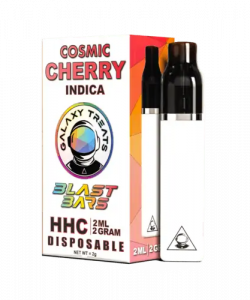
Galaxy Treats Blast Bars
Galaxy Treats produces all manners of cannabinoid products and they're all equally high-quality. Their HHC disposables come prefilled with 2 grams of HHC and are available in four different flavors, all of which are very tasty and very potent. We liked their 'Cosmic Cherry' HHC disposable the best, but all of their HHC disposables deliver effects that you'll really feel, so take it easy with these!
Check Price

Binoid HHC Vape Cartridges
Binoid has one of the largest selections of flavors for HHC vape carts, which are flavored naturally by plant terpenes. Their HHC carts are pure, unadulterated, and contain no synthetics. Each cart comes prefilled with a full gram of 100% hemp-derived HHC distillate, which contains ~91-94% HHC. Binoid makes the best HHC vape carts in 2022, hands down.
Check Price
Is HHC Safe?
It is always a good idea to try new compounds with an air of caution and HHC is no exception. While the potency is much less than some other cannabinoids, the fact that there is very little research on it leaves a lot of unanswered questions.
Another aspect of this is that there are almost no regulations in states where it is legal to use cannabis. This can mean potency and purity are unknown for the most part.
However, this can be mostly avoided by choosing a quality product from a reputable manufacturer. Some brands will even go so far as to provide third-party testing of their products to show the ratio of 9R HHC and 9S HHC.
For the most part, people typically agree that HHC is likely just as safe as regular delta-9 THC.
Can you vape HHC?
Yes, like with most other cannabinoids, HHC manufacturers commonly produce vape products like cartridges.
It can also be smoked, dabbed, and ingested as an edible like one of the many gummies on the market today.
While there is not much information regarding any potential side effects, it is considered to be about as safe as vaping delta-8.
Is HHC Legal?
One of the most pressing questions is the one regarding its legality within the United States. Many states have strict cannabis laws, preventing even hemp-derived delta-8 THC to be allowed. HHC finds itself in the same legal gray area as its counterparts.
HHC is hemp-derived, which means it is technically protected under the 2018 Farm Bill.
However, being accepted on the federal level does not mean it is legally accepted by all states. With many of these hemp-derived cannabinoids, naysayers always jump to bring up the Federal Analog Act.
This act states that “a controlled substance analog shall, to the extent intended for human consumption, be treated, for the purposes of any Federal law as a controlled substance in Schedule I.”
Sharing effects that could be described as analogous to cannabis-derived delta-9 THC means some believe HHC remains illegal. However, even in larger doses the effects of HHC are hugely less psychoactive.
This gives it a stronger case than other cannabinoids to be exempt from the Federal Analog Act. With any luck, this will keep HHC on the market for the foreseeable future.
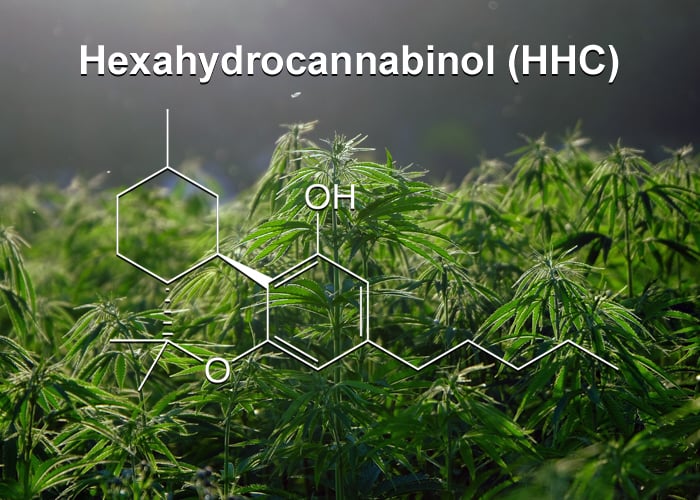
How Is HHC Made?
The process of getting an active compound like HHC or delta-8 THC from hemp is a fairly lengthy one and contains a number of steps. However, they typically start off the same way. The same goes for even THC-O.
The first step is to extract CBD isolate from federally legal hemp plants. This is a shared step with most hemp-derived cannabinoids, but HHC takes a different step from here.
Instead of synthesizing the CBD isolate into a THC compound, it undergoes the process of hydrogenation, which is also used in converting vegetable oil to margarine. This is where the extra hydrogen molecule comes into play.
It can be made from cannabis-derived THC as well, but this means the final product is not protected under the 2018 Farm Bill.
Kyle Ray, the COO of Colorado Chromatography is familiar with the process of producing HHC. In a discussion with Leafly, he described the manufacturing process as a property one that occurs inside a chemical reactor.
“Think about the reactor as a black box,” Ray said. “In goes CBD, out comes HHC.”
Does HHC Show Up on a Drug Test?
HHC has caused somewhat of a stir when it comes to its potential to evade a drug test, unlike the vast majority of other cannabinoids out there.
According to James Stephens, the vice president of innovation at Creo, there is some anecdotal promise that HHC can be missed in a drug test.
“I’ve also seen it advertised that HHC doesn’t convert to 11-hydroxy-THC, which is a common drug test metabolite,” he said in a discussion with Leafly.
That being said, this is only anecdotal evidence so it’s a very good idea not to risk your job with any upcoming drug tests.
There is so little known about the effects of HHC it is hard to even pinpoint how long it lasts in your system. However, if it were to show up in a drug test it would most likely be subject to the same factors as other cannabinoids like user tolerance and how often it is consumed.
How Does HHC Compare to Other Cannabinoids?
It is only natural to wonder where this relatively unknown compound fits into the grand scheme of cannabinoids.
Often the most important factors when it comes to new cannabinoid products are potency and effects, legal status, and how it is made. These can be very useful in understanding how HHC may fit into your life as a potential user.
When we refer to potency here, we are comparing the effects to that of traditional delta-9 THC.
HHC
As we mentioned earlier, these are the most important distinguishing factors for HHC.
- Hugely less potent
- Soothing high, similar to high doses of CBD
- Offers some pain relief
- Hemp-derived
- Legal gray area
HHC-O
HHC-O is the stronger sibling. It generally offers similar effects as HHC but to a greater degree.
HHC-O undergoes the same synthesis using acetic anhydride as THC-O. This makes the hemp-derived compound stronger than regular HHC as its bioavailability is increased, making it easier for it to bind with the body’s endocannabinoid system.
People looking to take the relaxing effects of HHC to a greater level typically migrate from HHC to HHC-O.
- Up to three times more potent than HHC
- Soothing high, muscle relaxation
- Hemp-derived
- Legal gray area
Delta-8
Another hemp-derived cannabinoid that gained popularity from being in a legal gray area, delta-8 THC offers a milder experience than the naturally occurring delta-9 found in cannabis.
It is often chosen for its relaxing and manageable effects in states where it is protected by the Farm Bill.
Despite being a hemp-derived cannabinoid, the increasing popularity of delta-8 has had some negative outcomes. It has caught the attention of lawmakers, which has resulted in it becoming outlawed in various states alongside delta-9 THC.
- More potent than HHC, less than delta-9 THC
- Sedating high, often referred to as Indica-like
- Hemp-derived
- Legal gray area, outlawed in some states
Delta-9 (Cannabis THC)
Delta-9 is the compound that we all think about when talking about cannabis. It is naturally occurring in both hemp and cannabis plants, although on hugely different levels.
The effects of delta-9 are well documented and are often what manufacturers aim to replicate with new cannabinoids.
It is also widely outlawed still within the United States. This is what has caused such a surge in hemp-derived compounds like HHC emerging.
- Benchmark potency
- Legal status fluctuates from state to state
- Naturally occurring
- Illegal in many states
Delta-10
Another hemp-derived cannabinoid, delta-10 shares a huge number of similarities with delta-8.
It is typically harder to produce large yields of delta-10, which can cause it to be harder to obtain. It also sits in the same legal gray area as the other hemp-derived cannabinoids mentioned.
It is also gaining popularity in states where delta-8’s popularity has led to it being prohibited. This makes sense as both compounds share fairly mild effects compared to delta-9 THC.
- More potent than HHC, less than delta-9 THC
- Energizing high, often referred to as Sativa-like
- Hemp-derived
- Legal gray area
THC-O
Tetrahydrocannabinol acetate (THC-O) is the big brother of hemp-derived delta-9 THC.
It is made from the same initial process as other hemp-derived cannabinoids but is then taken a step further like HHC-O to increase bioavailability and potency.
One could say HHC and THC-O are on opposite ends of the spectrum when it comes to their potency and effects.
This hemp-derived cannabinoid is extremely powerful and is often referred to as the “spiritual cannabinoid” for its near-psychedelic effects.
- Incredibly potent; up to three times stronger than delta-9 THC
- More psychedelic effects than other cannabinoids
- Hemp-derived
- Legal gray area
- Concerns around vaping it
The bottom line
Hexahydrocannabinol is one of the latest hemp-derived cannabinoids to have gained popularity for its manageable effects and legal status in the United States. However, even with popularity on the rise, there is a lot of mystery surrounding this cannabinoid.
It offers a very mellow high that is often reported to be soothing mentally and physically, making it a great option for those wanting a subtle mood boost without noticeable psychoactive effects.
In the world of synthetic cannabinoids, HHC is certainly a chilled experience that could be the answer for those of us with very low tolerances.


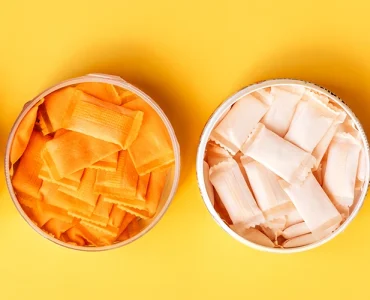



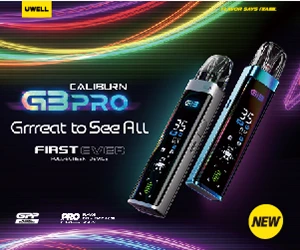

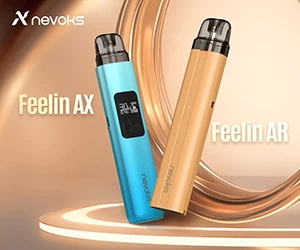


Add comment